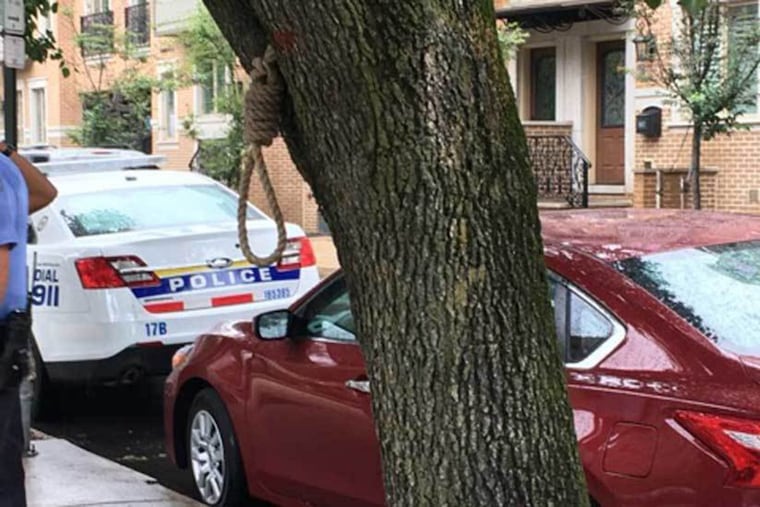Since Trump, more slurs, signs and discrimination in Philly
"We have never seen so many incidents," said Rue Landau, executive director of the Philadelphia Commission on Human Relations.

In South Philadelphia, a resident put up a sign that pointed toward a neighbor: Illegal alien lives here. Along Broad Street, a store window was spray-painted with a swastika and Sieg Heil. In Center City, a noose was placed around a tree.
The Philadelphia Commission on Human Relations classifies these acts as either "bias incidents" — slurs, signs, and other methods of intimidation, offensive but not illegal — or hate crimes, which are illegal and might include vandalism or assault.
And since Donald Trump won the presidential election, there seem to be more.
"We have never seen so many incidents," said Rue Landau, the commission's executive director for the last nine years. Part of that is because the commission has worked more closely since the election with Philadelphia police, where most of the commission's cases come from. But there's another reason, Landau said: People "are feeling more emboldened to speak out and act on their hateful beliefs."
Altogether, the commission — which tracks everything from work discrimination to neighbor disputes — has received 82 reports of hate crimes and bias incidents in the nine months since November. Numbers for previous years are hard to come by; the commission did not separate hate crimes and bias incidents from its overall list of cases until after Trump's victory, when reports of discriminatory graffiti spiked.
Nationwide, reports of hate crimes and discrimination have been more closely documented since Trump was elected, and in some cases also are increasing.
There were 541 anti-Semitic incidents in the first three months of this year — an 86 percent increase from the 291 incidents in the same period last year, according to the Anti-Defamation League. The Southern Poverty Law Center documented nearly 1,100 bias incidents in the month after the election, with immigrants being the most common targets, followed by black people, Muslims, and the LGBT community. (The center didn't have a comprehensive database of such incidents prior to the 2016 election.)
Landau and others point to Trump's rhetoric as a reason people may feel more willing to discriminate. Trump called Mexican immigrants "rapists" and "criminals," and suggested a ban on Muslims from entering the United States during the campaign. Last week, he appeared to defend neo-Nazis and white supremacists who marched in Charlottesville, Va., saying some were "very fine people."
"The sewers have been opened," said Marwan Kreidie, spokesman for Al-Aqsa Islamic Society, the North Philadelphia mosque at which someone tossed a severed pig's head in December 2015. Besides being disgusting in general population, a severed pig's head is especially offensive to Muslims who observe halal dietary laws. "People can say things that they hadn't said before."
At Temple Menorah Keneseth Chai in Northeast Philly, rocks were hurled through the stained-glass windows at least three times between December and March. One of the baseball-size rocks landed within a foot of Malcolm Adler, the synagogue's president, just as services were about to begin. Adler jumped back and yelled at the congregation of 20 people: "Move away from the windows!"
"It was a very scary evening," Adler recalled of the December incident. "We did not want the person or persons to know that they got to us. We continued on with our service as if nothing happened."
Police arrested a 13-year-old boy for the March rock-throwing, and Adler said he believed a teenager was behind the other incidents, too. Regardless of the motive — police said it was "kids being mischievous" — the damage was done.
"The congregants were very scared," Adler said. "They didn't want to come to services at nighttime."
Surveillance video can help identify hate crime suspects, as it did at Adler's synagogue. Investigators can also rely on eyewitnesses, if any exist.
With bias incidents that don't rise to the level of a crime, it's up to agencies such as the Human Relations Commission — rather than the police — to resolve them.
The commission responded when the South Philly resident put up the "illegal alien" sign: Individual conversations with the two neighbors revealed the victim wasn't actually illegal, and the sign was taken down.
"Sometimes it's just communication and dialogue that can resolve these situations," Landau said.
Authorities say the public should always report acts of intimidation, even if it's unclear whether they rise to the level of a crime.
"Whether the intent is malicious or, let's say, more of a prank, the effect is the same," said Elie Honig, director of New Jersey's Division of Criminal Justice. "It still victimizes the people who see it."
To report hate crimes in Philadelphia, call either police or the Human Relations Commission at 215-686-2856. New Jersey has a hotline, 800-277-BIAS. Pennsylvania suggests calling your police department.